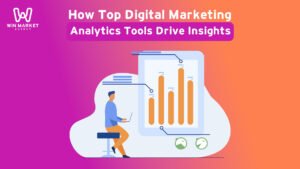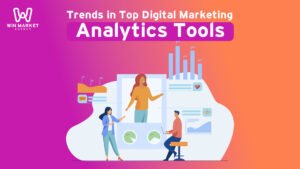In today’s data-driven landscape, the ability to analyze and interpret digital marketing metrics is crucial for businesses seeking to optimize their strategies and maximize their ROI.
Top digital marketing analytics tools empower marketers to gain insights into consumer behavior, track campaign performance, and make informed decisions based on real-time data.
Top Digital Marketing Analytics Tools
These tools not only streamline the process of gathering and analyzing data but also enable companies to identify trends, refine their targeting, and enhance overall effectiveness. As the digital marketing arena continues to evolve, leveraging the right analytics tools becomes imperative for staying competitive.
To navigate the myriad of options available and implement the most effective tools for your business, partnering with a specialized agency like Win Market can be invaluable. With expertise in digital marketing analytics, winmarket agency can help you select and utilize the best tools tailored to your specific needs, ensuring that you make data-driven decisions that drive growth and success.
How Top Digital Marketing Analytics Tools Drive Insights

In the fast-paced world of digital marketing, data has become the backbone of effective strategies. Understanding consumer behavior, campaign performance, and market trends is essential for businesses to thrive. Top digital marketing analytics tools play a crucial role in driving insights that inform decision-making and optimize marketing efforts.
This article explores how these tools generate valuable insights and enhance overall marketing strategies.
- Comprehensive Data Collection
- Top digital marketing analytics tools offer comprehensive data collection capabilities, aggregating information from various sources such as websites, social media platforms, email campaigns, and online advertisements.
- By consolidating this data, marketers gain a holistic view of their performance across multiple channels.
- This centralized data collection allows for more accurate analysis and comparison, facilitating informed decision-making.
- Real-Time Reporting and Dashboards
- One of the most powerful features of digital marketing analytics tools is the ability to provide real-time reporting. Marketers can access up-to-date metrics through customizable dashboards that visualize key performance indicators (KPIs).
- This immediate access to data enables businesses to quickly assess the effectiveness of their campaigns, identify areas for improvement, and make necessary adjustments on the fly.
- Real-time insights help marketers stay agile and responsive to changing consumer behaviors.
- Consumer Behavior Analysis
- Understanding consumer behavior is critical for effective marketing.
- Top analytics tools offer sophisticated tracking capabilities that monitor user interactions with websites and content.
- By analyzing metrics such as page views, time spent on site, bounce rates, and conversion rates, marketers can identify patterns in consumer behavior.
- These insights help businesses tailor their marketing strategies to meet the preferences and needs of their target audience, leading to more personalized and effective campaigns.
- Enhanced Targeting and Segmentation
- With the insights gained from digital marketing analytics tools, businesses can refine their targeting and segmentation strategies.
- By examining demographic data, interests, and online behaviors, marketers can create detailed customer profiles.
- This level of segmentation allows for more personalized messaging and targeted campaigns, ensuring that marketing efforts resonate with specific audience segments.
- Enhanced targeting improves engagement and conversion rates, ultimately driving higher ROI.
- Measuring ROI and Campaign Performance
- Understanding the return on investment (ROI) of marketing campaigns is essential for budget allocation and future planning.
- Top digital marketing analytics tools enable marketers to track the performance of individual campaigns and channels, providing clear insights into which efforts are yielding the best results.
- By measuring metrics such as cost per acquisition (CPA), customer lifetime value (CLV), and conversion rates, businesses can allocate resources more effectively and focus on strategies that deliver the highest returns.
- Identifying Trends and Opportunities
- Analytics tools are invaluable for identifying emerging trends and opportunities in the market.
- By analyzing historical data and comparing performance over time, marketers can spot shifts in consumer behavior and industry trends.
- This proactive approach allows businesses to adapt their strategies to align with changing market conditions and capitalize on new opportunities.
- Staying ahead of trends is crucial for maintaining a competitive edge.
- Data-Driven Decision Making
- Ultimately, the insights generated by top digital marketing analytics tools empower businesses to make data-driven decisions.
- Rather than relying on gut feelings or assumptions, marketers can base their strategies on concrete data and evidence.
- This shift towards data-driven decision-making not only enhances the effectiveness of marketing efforts but also fosters a culture of accountability and continuous improvement within organizations.
Top digital marketing analytics tools are essential for driving insights that inform marketing strategies and enhance overall performance. By providing comprehensive data collection, real-time reporting, consumer behavior analysis, and trend identification, these tools empower businesses to make informed decisions that optimize their marketing efforts.
Trends in Top Digital Marketing Analytics Tools

As the digital marketing landscape evolves, so too do the tools and technologies that enable marketers to analyze performance and make informed decisions. Top digital marketing analytics tools are continually adapting to meet the needs of businesses, incorporating new features and methodologies to provide deeper insights.
Here, we explore the latest trends shaping these analytics tools and their implications for marketers.
- AI and Machine Learning Integration
- Artificial Intelligence (AI) and machine learning are becoming integral components of digital marketing analytics tools.
- These technologies enable predictive analytics, allowing marketers to forecast future trends based on historical data.
- AI algorithms can identify patterns and anomalies in large datasets, offering insights that might be overlooked by traditional analysis methods.
- As a result, marketers can make proactive decisions and tailor their strategies to meet emerging consumer needs.
- Enhanced Data Visualization
- Effective data visualization is crucial for understanding complex datasets. Many top digital marketing analytics tools are now offering advanced visualization features that allow users to create interactive dashboards and reports.
- These visualizations make it easier for marketers to interpret data and share insights with stakeholders.
- By presenting information in a visually appealing and digestible format, businesses can facilitate better decision-making and communication across teams.
- Real-Time Analytics
- Real-time analytics have become a standard expectation in the digital marketing space.
- Marketers need immediate access to performance metrics to respond quickly to changes in consumer behavior and campaign effectiveness.
- Many analytics tools now provide real-time reporting capabilities, allowing businesses to monitor their strategies and adjust them on the fly.
- This agility is essential in a fast-paced digital environment, where trends can shift rapidly.
- Omnichannel Tracking
- As consumers interact with brands across multiple channels, the ability to track and analyze these interactions is becoming increasingly important.
- Top digital marketing analytics tools are enhancing their capabilities to provide omnichannel tracking, enabling marketers to see how users engage with their brand across various platforms—be it social media, email, websites, or mobile apps.
- This holistic view helps businesses understand the customer journey better and optimize their strategies accordingly.
- Focus on Customer Experience Metrics
- In the age of customer-centric marketing, analytics tools are placing greater emphasis on customer experience metrics.
- Marketers are now using tools that not only track traditional KPIs like traffic and conversions but also assess user satisfaction, engagement, and retention.
- Metrics such as Net Promoter Score (NPS) and Customer Satisfaction Score (CSAT) are being integrated into analytics platforms, helping businesses align their strategies with customer expectations and improve overall satisfaction.
- Increased Privacy Measures
- With growing concerns about data privacy and new regulations like GDPR and CCPA, digital marketing analytics tools are adapting to prioritize user privacy.
- Many platforms are incorporating features that allow businesses to track performance while respecting user consent and privacy rights.
- This trend not only helps companies stay compliant but also builds trust with consumers, as they become more aware of how their data is being used.
- Integration with Other Marketing Technologies
- The integration of analytics tools with other marketing technologies is another significant trend.
- Marketers are increasingly seeking solutions that can seamlessly connect with their Customer Relationship Management (CRM) systems, content management systems, and email marketing platforms.
- This integration allows for a more cohesive marketing strategy, where insights from analytics inform content creation, lead nurturing, and campaign optimization.
- Automated Reporting and Insights
- Automation is transforming how marketers approach reporting.
- Many top digital marketing analytics tools now offer automated reporting features that generate insights and summaries without manual intervention.
- This not only saves time but also ensures that key stakeholders receive consistent and timely updates.
- Automation allows marketers to focus on strategy and execution rather than getting bogged down in the details of data analysis.
Top Digital Marketing Analytics Tools
The trends in top digital marketing analytics tools reflect a shift toward greater integration, real-time insights, and a focus on customer experience.
As these tools evolve, they empower marketers to make data-driven decisions that enhance their strategies and improve overall performance.
To effectively leverage these trends and maximize the impact of your analytics efforts, partnering with an experienced agency like Win Market can provide valuable support.



